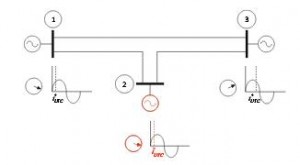Spoofing GPS Receiver Clock Offset of Phasor Measurement Units
Xichen Jiang with adviser A. Domínguez-García
Reliability has been a central issue as the current power system undergoes changes to meet new Smart Grid standards. Integrating new technology increases the complexity of the existing system and adds additional sources of uncertainty. One such technology receiving considerable attention is synchronized phasor measurement units (PMUs), which are synchronized through Navstar GPS signals. PMUs provide wide-area measurements in power systems, allowing for real time state estimation and power grid monitoring.
Synchronization is essential for the proper operation of PMUs. My research involves developing a data-level spoofing method that can cause PMUs to lose synchronization. This attack is conducted by changing the GPS ephemeris data, which causes the receiver to compute an incorrect receiver clock bias while keeping the same position. Figure 22 illustrates the effect of GPS spoofing on bus 2 of a three-bus system, which records an incorrect time stamp as a result of GPS data spoofing. Simulation results show that a maximum time shift of 8 ms for the clock correction is possible, corresponding to a phase shift of half a cycle. Such an error in the clock bias invariably manifests into errors in the power system state estimation. As an illustration of the possible impact of GPS spoofing, simulations of spoofing and its effect on a real-time stability algorithm that uses the PMUs’ measurements are conducted. Both instances of false alarm and misdetection are observed.
This research is supported by the National Science Foundation grant NSF ECCS 09 54420 CAR.
